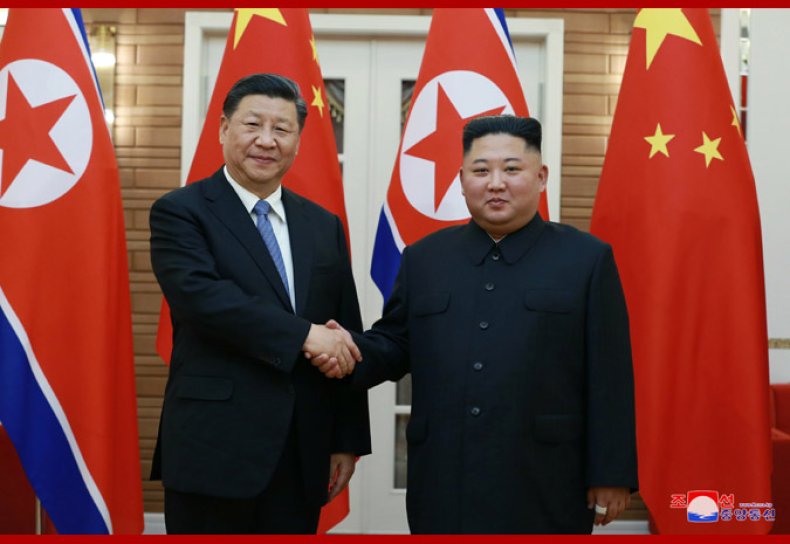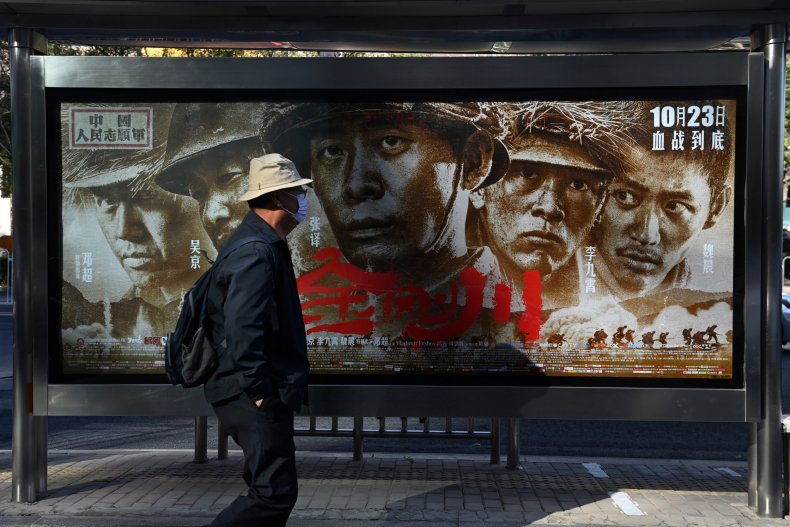North Korea Tells China They Should Team Up on 'Hostile Forces' as Both Face Biden
North Korean Supreme Leader Kim Jong Un reportedly praised his country's close ties with neighboring China, looking to boost their ties as both deal with hostile policies from the United States.
Kim's message first appeared on China's state-run Xinhua News Network, which reported Monday that Chinese President Xi Jinping had exchanged spoken messages with the North Korean ruler via representatives of China, officially the People's Republic of China, and North Korea, formally the Democratic People's Republic of Korea. The exchange was then carried by North Korea's official Korean Central News Agency.
Kim informed Xi of the results of his ruling Korean Workers' Party 8th Party Congress in January, "as required by the times that call for intensifying the strategic communication between the two parties on the basis of deep comradeship."
The event, according to Kim, "set forth scientific and realistic struggle lines and strategic and tactical tasks for achieving a fresh innovation in the Party and state affairs, as required by the changed internal and external situations and reality."
He said the affair "took practical measures to strengthen the leadership and fighting efficiency of the Party, bring about its sound development and consolidate the state and social system, and fixed the direction of the advance and struggle policies of the Korean revolution, including discussion of and decision on the economic strategy and a new long-term plan in the current stage."
Kim also touched upon Pyongyang's recent turn on Washington and Seoul.
"Informing in detail that the WPK discussed and decided on its policy stand on the bolstering of defence capabilities of the country, the inter-Korean relations and the DPRK-U.S. relations after an in-depth study and analysis of the situations of the Korean peninsula and the international relations," Kim's message "stressed the need to strengthen the unity and cooperation between the two parties and two countries to cope with the hostile forces' all-round challenges and obstructive moves."
Kim said it was the will of his party and people "to vigorously advance the cause of socialism by dint of friendship and unity, the message expressed belief that the cooperation between the two parties would continue to go well and the friendly relations between the two countries would grow stronger, as required by the times and in conformity with the desires, wishes and core interests of the two peoples this significant year."
2021 is set to mark the centenary of the founding of the Chinese Communist Party as well as the 60th anniversary of the conclusion of the DPRK-China Treaty of Friendship, Cooperation and Mutual Assistance, the only defense treaty either country have with any other nation.
Kim finally "wished Xi Jinping good health and bigger success in performing his heavy duty of leading the CPC and the Chinese people," according to the Korean Central News Agency's account.

Xinhua and other Chinese state-run media outlets offered their own narrative of the messages, which were reportedly conveyed through senior diplomats.
In remarks delivered by North Korean ambassador to China Ri Ryong Nam, Kim "gave a comprehensive briefing" of the 8th Party Congress, and praised Xi's leadership of his Chinese Communist Party, under which "the Chinese people have succeeded in combating the global public health crisis and made remarkable achievements in completing the building of a moderately prosperous society in all respects and in the struggle for the complete eradication of poverty," according to Xinhua.
Kim took "the unswerving position" on behalf of himself, the Korean Workers' Party and the people of North Korea "to strengthen and develop DPRK-China relations into an envy of the world, and push forward the socialist cause with friendship and solidarity, adding that the DPRK side firmly believes that DPRK-China friendly relations will be lifted and developed in accordance with the requirements of the times as well as the aspirations, wishes and fundamental interests of the two peoples."
Chinese Communist Party International Department Minister Song Tao, speaking for Xi congratulated Kim for his Party Congress and "said that the traditional friendship between China and the DPRK is a precious treasure shared by the two parties, two countries and two peoples."
"Under the new situation, the Chinese side stands ready to work with the DPRK comrades to maintain, consolidate and develop China-DPRK relations, and strive to achieve new outcomes in the socialist causes of both countries, so as to bring more benefits to both peoples," he added.
Xi took note that "the world is now undergoing transformations rarely seen in a century, which is overlapped by the once-in-a-century pandemic," and said events across Asia and the globe also presented "profound changes."
"The Chinese side is willing to work with the DPRK side and other related parties to stick to the direction of political settlement of the Korean Peninsula issue and preserve peace and stability on the peninsula," Xi said, "so as to make new and positive contributions to regional peace, stability, development and prosperity."
China and North Korea's close ties date back to the founding of the People's Republic in 1949, and the outbreak of the Korean War in the latter a year later, a conflict in which Chinese troops supported North Korean forces, with the backing of the Soviet Union, against South Korea and a U.S.-led United Nations coalition. The fighting ended with a stalemate and the establishment of an armistice but no official peace, a situation that continues to this day.
Beijing has since proven to be by far Pyongyang's closest foreign partner, though Chinese leadership has not endorsed the Kim dynasty's development of nuclear weapons.
China has offered to play a role in resolving ongoing hostilities on the Korean Peninsula, and the topic came up during the first-ever meeting between Chinese officials and U.S. delegates of President Joe Biden's administration. The Chinese Foreign Ministry said the two sides "exchanged views" on the matter along with a number of others, "and agreed to maintain and enhance communication and coordination."
But public segments of the debut conversation were tense at times, with Washington's side leading off with some of the most controversial takes between the two top powers and seeking a "position of strength" in doing so.
Still, North Korea was also among the list of topics in which U.S.-China "interests intersect," Secretary of State Antony Blinken told reporters Friday following the conclusion of the Alaska dialogue.
That same day, however, the North Korea Foreign Ministry issued a statement referencing the troubled history of Pyongyang and Washington, referred to as "the principal enemy of our state" in remarks echoing Kim's 8th Party Congress speech.
"The relations between the DPRK and the U.S.—the most hostile one on this planet—are technically in the state of war for over 70 years," the ministry said in a statement Friday, "and it turns out to be an undeniable reality."
The statement hit out at Malaysia over the unprecedented extradition of North Korean national Mun Chol Myong from the Southeast Asian country to the U.S. on financial fraud charges. In censuring Malaysia, the ministry also warned "in advance that the U.S.—the backstage manipulator and main culprit of this incident—that it will also be made to pay a due price."
The comments were just the latest in a series of harsh messages from North Korea. First Vice Minister Choe Son Hui confirmed on Thursday that Pyongyang had ignored overtures for talks from the Biden administration on Thursday on the grounds that Washington's "hostile policy" must first be reversed, and Korean Workers' Party Central Committee Vice Department Director Kim Yo Jong last week took "the opportunity to warn the new U.S. administration trying hard to give off powder smell in our land."
"If it wants to sleep in peace for coming four years, it had better refrain from causing a stink at its first step," Kim Yo Jong, who is Kim Jong Un's sister, said of the Biden administration at the time.

The Biden administration has said it was reviewing the U.S. approach to North Korea after former President Donald Trump unsuccessfully sought to forge a denuclearization-for-peace and sanctions relief agreement with Kim Jong Un, and became the first sitting U.S. president to meet a North Korean supreme leader.
"The United States is conducting a thorough interagency review of the U.S. policy towards North Korea, and we're also evaluating all the options available to address the increasing threat posed by North Korea as well as to its neighbors and, quite frankly, our international community," State Department spokesperson Ned Price said Friday. "And we're going to continue to lead a structured and detailed policy process that has an integrated a diverse set of voices from the government as well as outside of the government, which includes think tanks and outside experts."
Biden had sent Blinken and Defense Secretary Lloyd Austin to South Korea and Japan just ahead of the U.S.-China talks in Alaska, and discussed a strategy for "the denuclearization of North Korea" on both stops. The phrase also came up earlier this month for the first time in the context of the Quadrilateral Security Dialogue, a grouping that includes Australia, India, Japan and the U.S., all of whom have raised the alarm about a perceived threat posed by China.
State Department spokesperson Jalina Porter echoed this position on Monday when asked about the Mun's extradition.
"I'll just reiterate that the United States remains committed to denuclearizing North Korea, and any other details I would have to refer back," Porter told reporters during a regular briefing.
As for Kim Jong Un, his 8th Party Congress marked a departure from the failed rapprochement under Trump, and the ruler proclaimed North Korea would "adopt an adroit strategy toward the U.S. and steadily expand solidarity with the anti-imperialist, independent forces."
North Korea and China are among the 17 parties to sign on to an international grouping known as the "Group of Friends in Defense of the Charter of the United Nations," which earlier this month shared its call for additional members with Newsweek.

